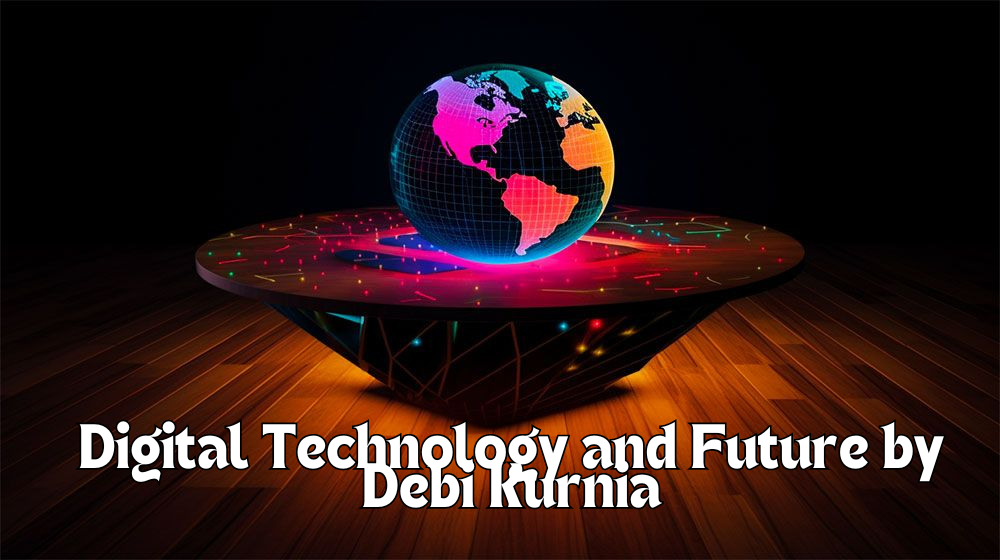Today we are talking about digital technology and future by debi kurnia. In the modern era, digital technology has become the cornerstone of innovation, profoundly influencing every facet of our lives. From the way we communicate to the way we work, learn, and entertain ourselves, digital technology has fundamentally altered the human experience. As we stand on the brink of the fourth industrial revolution, the transformative power of digital technology is set to redefine the future in ways that are both promising and challenging. This article explores the multifaceted impact of digital technology on the future, focusing on its potential to revolutionize industries, shape global economies, and redefine societal norms.
The Evolution of Digital Technology and Future by Debi Kurnia
The journey from analog to digital technology and future by debi kurnia marks one of the most significant shifts in human history. The transition began in the mid-20th century with the advent of computers and has since evolved at an unprecedented pace. Early digital devices, characterized by limited processing power and storage, have given way to sophisticated systems capable of performing trillions of operations per second. Key innovations like the development of microprocessors, the internet, and wireless communication technologies have fueled this rapid evolution.
Key Milestones in Digital Technology
- 1960s: The development of the first microprocessors laid the foundation for modern computing.
- 1980s: The personal computer revolutionized both personal and professional tasks.
- 1990s: The birth of the internet connected the world in ways previously unimaginable.
- 2000s: The rise of mobile technology made digital access ubiquitous.
- 2010s: Cloud computing and big data analytics became integral to business operations.
- 2020s and Beyond: Artificial intelligence (AI), the Internet of Things (IoT), and blockchain are poised to drive the next wave of innovation.
The Transformative Power of Digital Technology and Future by Debi Kurnia
The healthcare industry has been one of the most significant beneficiaries of digital technology. The integration of AI, telemedicine, and electronic health records (EHRs) has enhanced patient care, improved diagnostic accuracy, and streamlined administrative processes. For instance, AI-powered diagnostic tools can analyze medical images with a precision that rivals human experts, while telemedicine platforms have made healthcare more accessible to remote and underserved populations.
Education is another sector where digital technology has had a profound impact. The proliferation of online learning platforms, virtual classrooms, and digital resources has democratized access to education. Students around the world can now access high-quality learning materials and instruction, regardless of their geographic location. Additionally, personalized learning experiences powered by AI are enabling students to learn at their own pace, further enhancing educational outcomes.
The advent of digital technology has also redefined the workplace. Automation, AI, and remote work technologies are transforming how businesses operate and how employees interact with their work environment. Automation is taking over repetitive tasks, allowing human workers to focus on more complex and creative tasks. AI is being used to enhance decision-making processes, while remote work technologies have enabled the rise of the global workforce, offering unprecedented flexibility and work-life balance.
The Economic Impact of Digital Technology and Future by Debi Kurnia
Digital technology is a key driver of global economic growth. By enabling new business models, reducing operational costs, and opening up new markets, digital technology is contributing to increased productivity and economic expansion. For example, e-commerce platforms have revolutionized retail by allowing businesses to reach a global audience with minimal overhead costs. Additionally, the gig economy has given workers all over the world new opportunities thanks to digital platforms.
In developing economies, digital technology is playing a crucial role in driving economic development. Mobile banking, for instance, has brought financial services to millions of unbanked individuals, fostering economic inclusion. Moreover, digital platforms are empowering small and medium-sized enterprises (SMEs) in these regions to compete on a global scale, driving job creation and economic growth.
Societal Implications of Digital Technology and Future by Debi Kurnia
Digital technology has not only transformed industries but also redefined societal norms and interactions. Social media platforms have become the new public squares, where ideas are exchanged, movements are born, and communities are formed. However, this digital interconnectivity also presents challenges, such as the spread of misinformation, privacy concerns, and the potential for social isolation.
As digital technology continues to evolve, ethical considerations are becoming increasingly important. Issues such as data privacy, cybersecurity, and the ethical use of AI are at the forefront of discussions about the future of digital technology. It is essential that as we advance technologically, we also develop robust frameworks to address these ethical challenges and ensure that digital technology is used responsibly.
Conclusion
The future of digital technology is both exciting and uncertain. While it holds immense potential to drive progress and improve lives, it also presents significant challenges that must be carefully managed. As we continue to integrate digital technology into every aspect of our lives, it is crucial that we remain mindful of its impact and work towards a future that leverages its benefits while mitigating its risks.
In conclusion, digital technology is not just shaping the future; it is the future. By understanding and harnessing its power, we can create a world that is more connected, more efficient, and more equitable.




